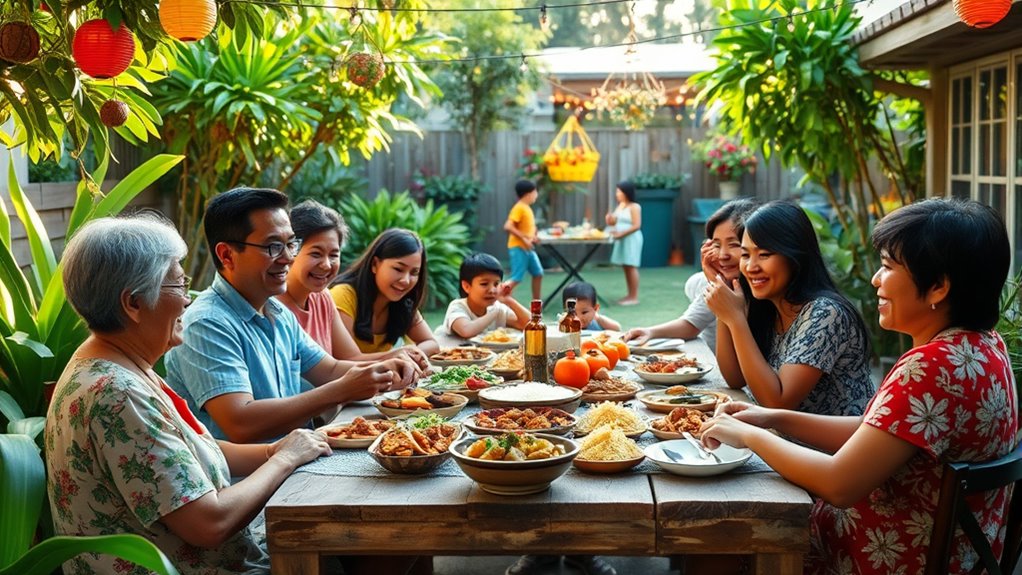To successfully integrate into your Filipina wife’s family, embrace their close-knit values and engage in family traditions. Show respect by participating in gatherings, listening actively, and valuing elders’ input. Learn basic Tagalog phrases to communicate more effectively and foster connections. Offer warmth and courtesy, and don’t hesitate to join in cooking traditional meals or celebrating significant events. You’ll create lasting bonds and cherished memories. Discover even more ways to strengthen your family ties.
Key Takeaways
- Actively participate in family gatherings and traditions to show commitment and strengthen bonds with your Filipina wife’s family.
- Learn basic Tagalog phrases to demonstrate respect and effort in connecting with her family members.
- Show genuine interest by asking about cultural customs and listening actively during conversations with her family.
- Respect elders by seeking their advice and using appropriate titles to honor their status within the family.
- Engage in cooking traditional Filipino dishes together to create shared experiences and build lasting memories.
Understanding Filipino Family Values

When you marry a Filipina, you’re not just gaining a partner; you’re also becoming part of a close-knit family that values strong bonds and mutual support.
Understanding Filipino family values is essential for your integration. Family comes first, meaning you’ll often find relatives involved in decisions and gatherings.
Embracing Filipino family values is crucial; expect relatives to play an active role in your shared journey.
Respect for elders is paramount, so show them deference, and don’t hesitate to seek their advice. Open communication is key; be honest and approachable, as this fosters trust.
Loyalty and support among family members are expected, so be ready to participate in both celebrations and challenges.
Finally, embrace the warmth and hospitality you’ll encounter; it’s a way of life that strengthens connections and nurtures love within the family.
Embracing Cultural Traditions

Becoming part of your Filipina wife’s family means embracing the rich tapestry of cultural traditions that shape their identity. Immerse yourself in local customs, whether it’s celebrating holidays like Christmas or participating in family gatherings. Understanding the importance of family ties can enhance your connection with her loved ones.
Don’t shy away from traditional Filipino foods; try your hand at cooking favorite dishes together to bond. You’ll also find joy in learning about regional dances, music, and art forms that reflect their heritage. Attend important events, like baptisms or weddings, where family ties are strengthened. Show genuine interest in these traditions, and don’t hesitate to ask questions; this indicates respect and appreciation. Additionally, understanding the significance of family in Filipino culture is essential for building strong relationships, as family ties play a crucial role in their social dynamics.
Communicating Effectively With In-Laws
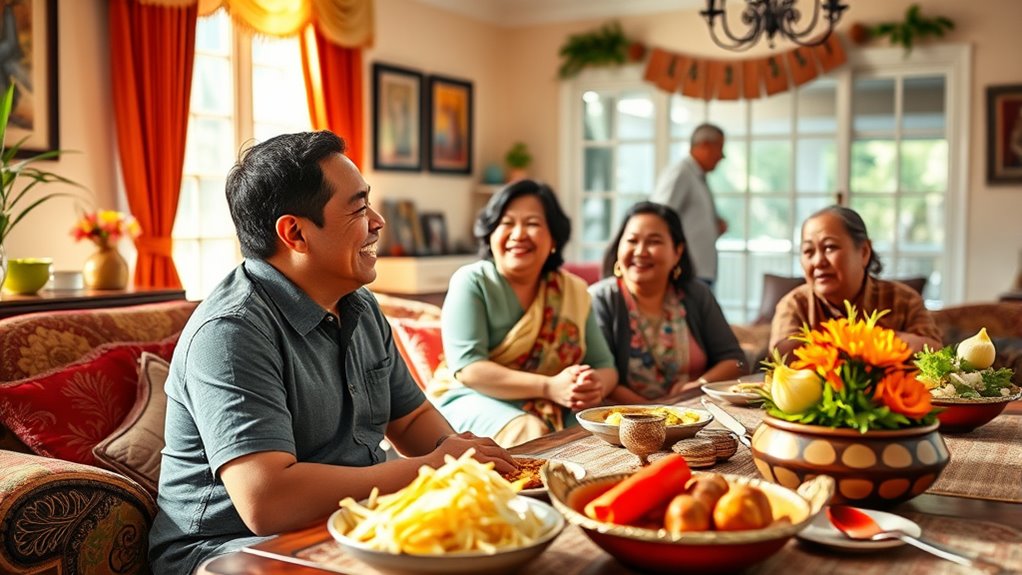
While steering your relationship with your Filipina wife’s family, effective communication is key to building strong bonds. Start by learning a few basic phrases in Tagalog or their dialect; this shows effort and respect.
Make it a point to listen actively. When they share stories or cultural insights, engage with genuine interest. Don’t hesitate to ask questions—this demonstrates that you value their experiences and perspectives.
Be mindful of non-verbal cues; body language can convey as much as words. Remember to be patient, as language barriers might arise.
Be aware of body language and remain patient; language barriers may occur, but understanding can transcend words.
Ultimately, keep your tone friendly and open. The more you communicate, the easier it’ll be to forge lasting connections with your in-laws and create a harmonious family dynamic.
Showing Respect and Courtesy
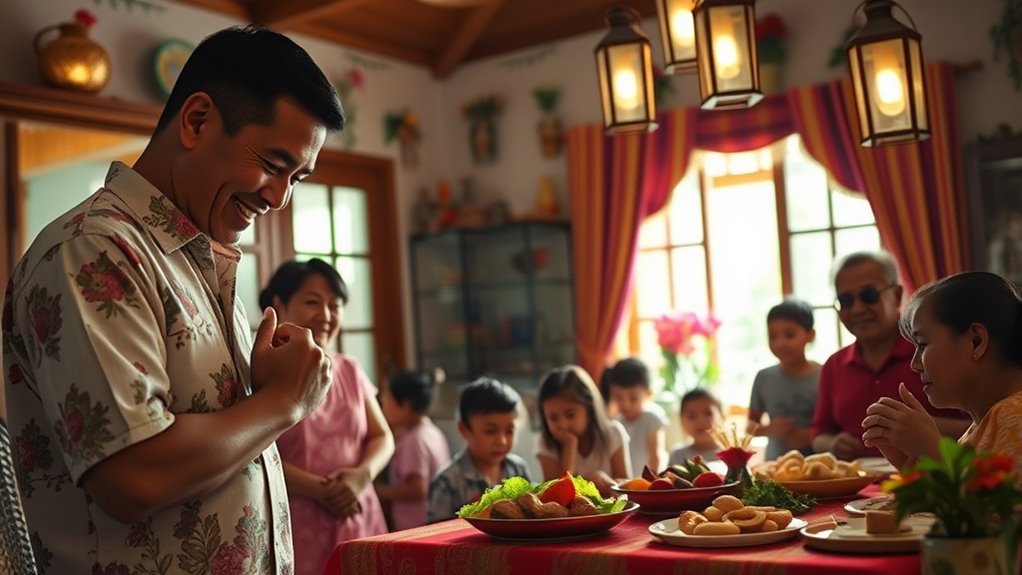
Respect and courtesy are foundational elements in fostering a positive relationship with your Filipina wife’s family. Always greet her family members warmly and use appropriate titles, like “tita” or “tito,” to show respect.
When speaking, listen actively and avoid interrupting, as this illustrates that you value their opinions. Be mindful of cultural customs, such as offering a small gift when visiting or asking permission before taking photos. Developing high cultural intelligence can significantly enhance your ability to navigate these interactions successfully.
Show appreciation for their hospitality, whether it’s through a simple thank you or by helping out during gatherings. Remember, your actions speak volumes, so be genuine in your interactions. Additionally, expressing gratitude can reflect spiritual principles that enhance family bonds and relationships.
Participating in Family Gatherings
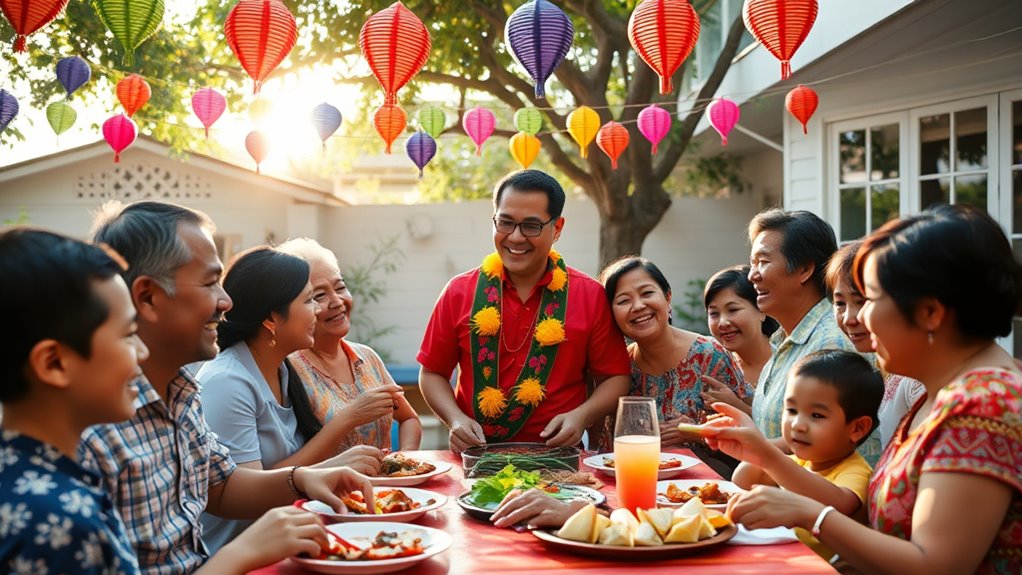
Building on the respect and courtesy you’ve shown, participating in family gatherings is a wonderful way to deepen your connection with your Filipina wife’s family.
These occasions often involve food, laughter, and shared stories, creating a warm atmosphere. Embrace these moments by being present and engaging with family members. Offer to help with preparations or clean-up, as this shows your willingness to contribute. Don’t hesitate to join in on games or conversations; your active participation will be appreciated. Additionally, practicing kindness and compassion during these gatherings will foster a sense of belonging and strengthen your bonds with family members.
Learning Basic Filipino Language Phrases

Learning some basic Filipino language phrases can greatly enhance your relationship with your Filipina wife’s family, as it shows your effort to connect with their culture. Start with simple greetings like “Kamusta?” (How are you?) and “Salamat” (Thank you). These phrases can go a long way in breaking the ice.
Learning basic Filipino phrases can strengthen your bond with your Filipina wife’s family and show your appreciation for their culture.
You might also want to learn “Magandang umaga” (Good morning) and “Magandang gabi” (Good evening) to greet family members appropriately.
Practice these phrases regularly to improve your pronunciation. Don’t worry about making mistakes; your family will appreciate your effort.
Consider using language apps or taking a class to expand your vocabulary. The more you learn, the more comfortable you’ll feel during family gatherings and conversations.
Being Open to New Experiences

Since family gatherings often involve unique traditions and customs, being open to new experiences can help you bond with your Filipina wife’s family.
Embrace the chance to participate in local celebrations, whether it’s a fiesta, holiday, or simple family get-together. Try the traditional dishes, even if they’re unfamiliar; showing enthusiasm for the food can create a warm atmosphere. You might also find that different regions of the Philippines have their own local celebrations, similar to how events like the Fort Worth Stockyards in Texas showcase unique cultural heritage.
Learn about their customs, such as “bayanihan” or communal spirit, and engage with activities that may differ from your own culture. Your willingness to step outside your comfort zone demonstrates respect and appreciation for their heritage. Additionally, understanding the importance of proper disposal methods can enhance your interactions, especially during gatherings where food and waste management practices may differ.
This openness not only fosters connections but also enriches your own understanding of their way of life, making you feel like part of the family.
Building Relationships With Extended Family

Although you might feel a bit overwhelmed at first, forging connections with your Filipina wife’s extended family is essential for creating a strong bond.
Start by attending family gatherings and showing genuine interest in their lives. Use simple greetings in their native language; it shows respect and effort. Ask questions about their traditions and stories, and listen actively—this builds trust and rapport.
Don’t hesitate to share your own culture; they’ll appreciate your openness. Small gestures, like bringing a dish to share or offering help, can go a long way.
Navigating Cultural Differences
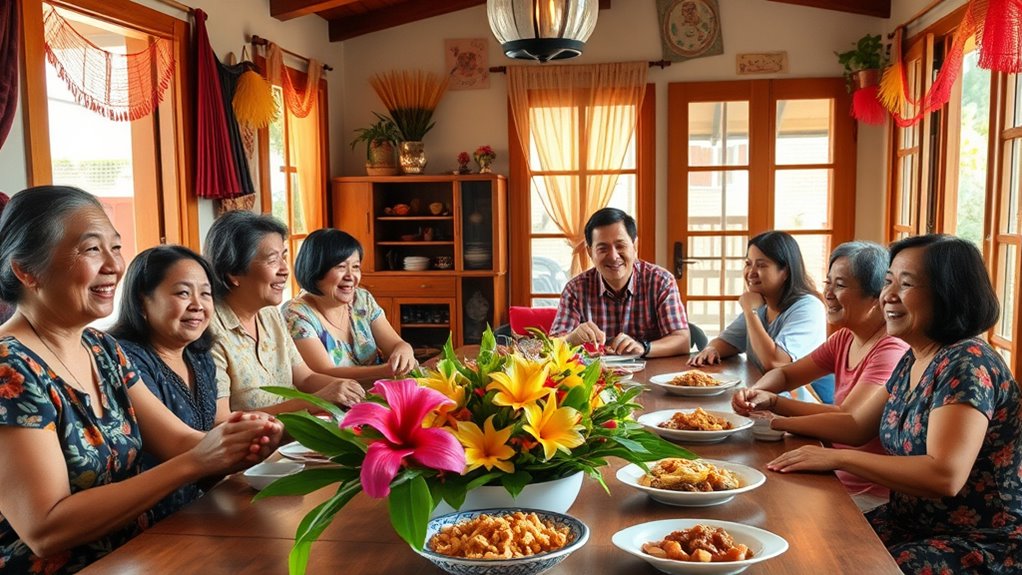
Understanding and embracing cultural differences can greatly enhance your relationship with your Filipina wife and her family. Start by educating yourself about Filipino customs, traditions, and values. This knowledge helps you appreciate their way of life and shows respect for your wife’s heritage.
Embrace cultural differences by learning about Filipino customs to strengthen your bond with your Filipina wife and her family.
Communication is key—ask questions when you’re unsure about something, and listen actively to their responses. Be open to trying new foods, participating in family gatherings, and understanding the significance of familial ties.
Remember, family is often the cornerstone of Filipino culture, so demonstrating your commitment to her family can strengthen your bond.
Finally, approach any misunderstandings with patience and empathy, as maneuvering cultural differences takes time and effort from both you and your wife.
Establishing Your Own Family Traditions
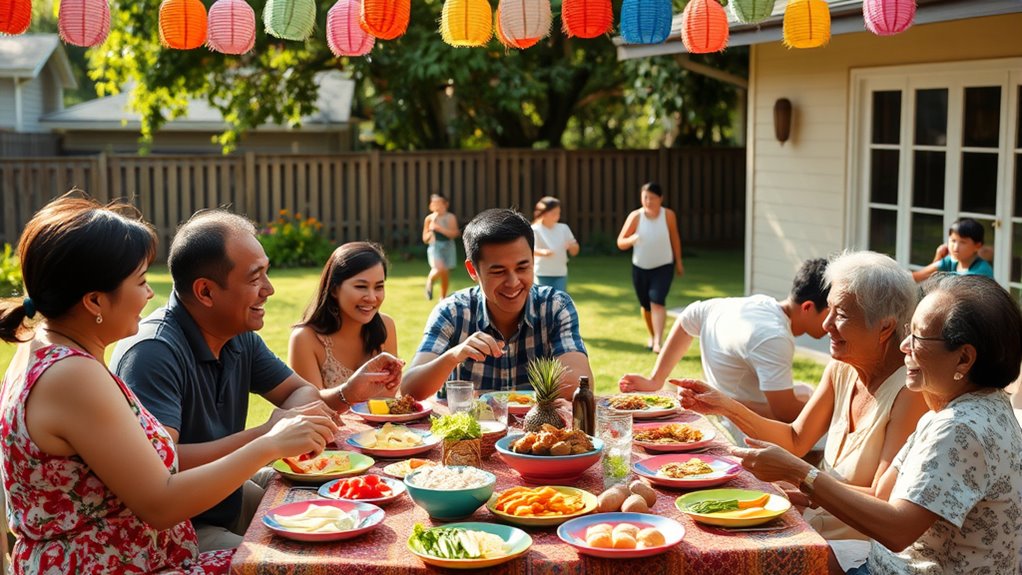
As you blend your life with your Filipina wife’s family, creating your own family traditions can foster a sense of unity and belonging.
Start by discussing meaningful customs that resonate with both of you. Consider combining elements from your backgrounds, like holiday celebrations, food traditions, or weekend activities.
Involve your wife in the planning; her insights will help guarantee these traditions are embraced by her family. For instance, you might host an annual family potluck featuring dishes from both cultures.
Encourage participation from everyone, especially children, to pass down these traditions. Document your traditions through photos or stories, creating a family history.
Ultimately, these shared experiences will strengthen your bond and create lasting memories.
Frequently Asked Questions
How Can I Respectfully Address My Filipina Wife’s Family Members?
When addressing your Filipina wife’s family, use respectful terms that reflect their cultural values. Start with “Tita” for an aunt and “Tito” for an uncle, or simply “Ma’am” and “Sir” for older relatives.
If you’re unsure, ask your wife for guidance. Always maintain a polite tone and show genuine interest in their conversations.
Acknowledging their traditions and using their preferred names can foster positive relationships and show your respect for their culture.
What Gifts Are Appropriate for Family Gatherings?
When you’re pondering presents for family gatherings, personal touches can pack a powerful punch. Popular picks include pastries, fresh fruits, or local delicacies that showcase your thoughtfulness.
If you’re feeling fancy, consider fun games or family-friendly activities that foster bonding. Always keep cultural significance in mind; something simple yet sincere often speaks volumes.
Ultimately, it’s the gesture that matters most, so let your heart guide your choices at these special events.
How Do I Handle Cultural Misunderstandings Gracefully?
When you encounter cultural misunderstandings, stay calm and open-minded. Acknowledge the difference without getting defensive.
Ask questions to clarify, showing genuine interest in their perspective. If you make a mistake, apologize sincerely and learn from it.
Humor can help lighten the mood, but be careful not to offend. Remember, everyone makes mistakes, and showing respect and willingness to understand goes a long way in bridging cultural gaps.
What Role Do Family Elders Play in Decision-Making?
Picture a family council that feels like a scene from a classic movie. In many cultures, family elders hold significant sway in decision-making. They offer wisdom, experience, and guidance, and their opinions can shape the outcome of important choices.
When you’re steering decisions, it’s essential to respect their input and engage with them. Building relationships with these elders can help you gain their trust and support, making the process smoother for everyone involved.
Are There Any Taboos I Should Avoid in Filipino Culture?
When traversing Filipino culture, it’s essential to avoid certain taboos. For instance, don’t speak ill of family members or criticize their traditions; respect is paramount.
Refrain from discussing sensitive topics like politics or religion too openly, as these can lead to discomfort.
Also, avoid pointing with your finger, as it’s considered rude.
Being mindful of these taboos will help you foster positive relationships and show your respect for the culture.
Conclusion
Integrating into your Filipina wife’s family can feel like stepping into a vibrant tapestry, each thread representing a unique tradition and value. By embracing their culture, communicating openly, and participating actively, you’ll weave yourself into this beautiful fabric. Remember, respect and openness are your best tools. As you build relationships and create new family traditions, you’ll find that your connection grows stronger, making the tapestry even richer and more colorful with each passing day.
